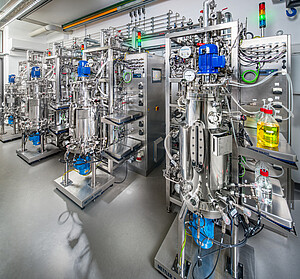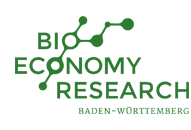Microbial valorisation of lignocellulose-hydrolysates for the production of rhamnolipid biosurfactants

© M. Zentsch
Bacteria of the genus Pseudomonas have found increasing use in biotechnology in recent years. They have been developed as biocatalysts, are hosts for the production of secondary metabolites such as biosurfactants and also serve as innovative expression hosts for (pharmaceutical) proteins. They are physiologically, metabolically and genetically versatile and physiologically extremely robust, which qualifies them as platform organisms that can be used widely. The target molecules here were different types (“congeners”) of rhamnose lipids. Compared to surfactants of petrochemical origin, rhamnolipids are distinguished by the fact that their biosynthesis is based on renewable raw materials and that they are completely biodegradable. Based on recombinant Pseudomonas putida KT2440 strains, novel strains should be constructed which, in addition to the genes for rhamnolipid production, also carry metabolic pathways for wood sugar utilization, also plasmid-encoded. The rhamnolipid production of these basic strains with pure wood sugars (xylose, glucose, arabinose, mannose), idealized mixtures and real hydrolysates were analyzed comparatively. When P. putida KT2440 grows on wood sugars, considerable amounts (up to 50% of the sugar used) of the corresponding sugar acids (xylonate, arabinoate and mannoate were measured) are produced in microorganisms as "dead-end" products because they can no longer be used. In order to increase the efficiency of the production of rhamnolipids based on wood sugar, the formation of sugar acids had to be minimized or completely prevented. Based on many years of experience in the fermentative production of rhamnolipids, similarly powerful fermentation processes were developed as previously described by the partners for the "conventional" production of rhamnolipids. At the end of the project, a process was available that enables the efficient and complete conversion of wood sugars, even in real lignocellulose hydrolysates, with a high yield of rhamnolipids at the same time. The aim here was, as a proof-of-concept, a yield of initially 5g per liter of fermentation broth based on wood sugar.
| Project title | Microbial valorisation of lignocellulose-hydrolysates: full conversion of wood sugars for the production of rhamnolipid biosurfactants |
| Institutions and researchers | University of Hohenheim, Institute of Food Science and Biotechnology, Bioprocess Engineering Universität Ulm, Institute of Pharmaceutical Biotechnology |
